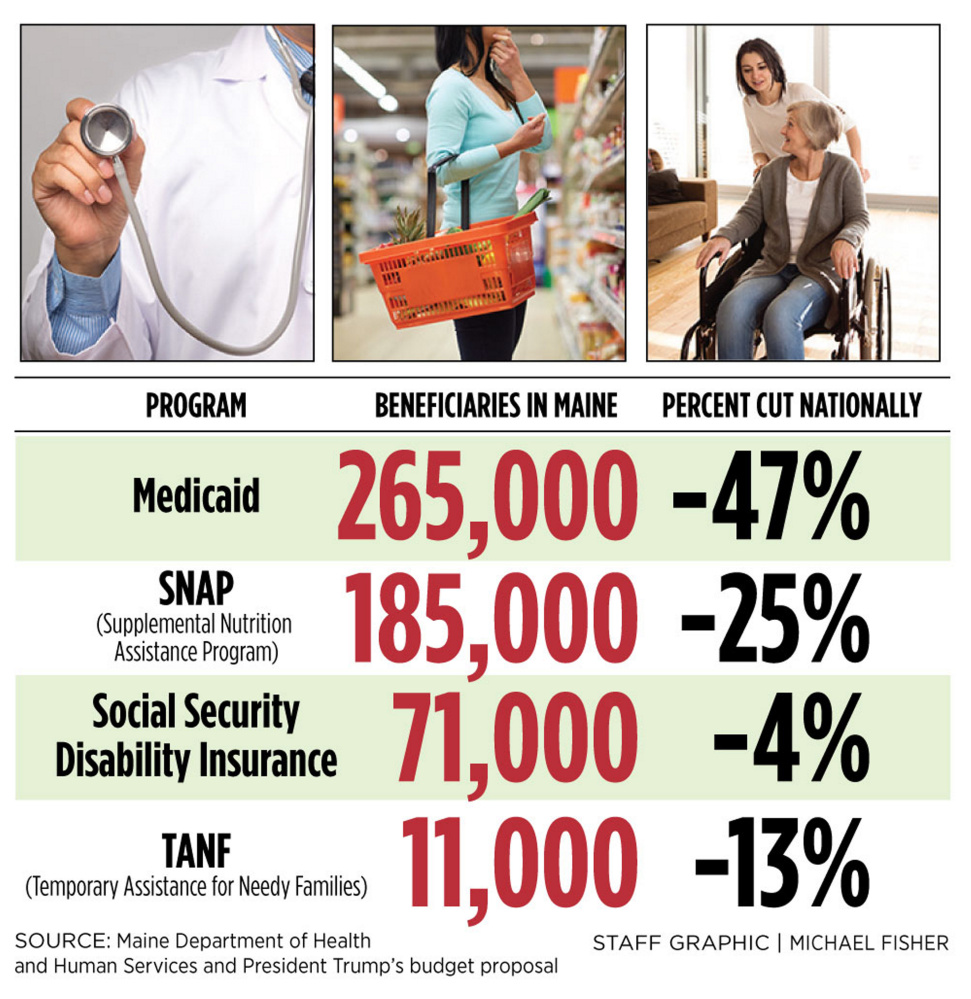President Trump’s budget proposal would affect thousands of Mainers by slashing spending for health and safety net programs, including Medicaid, food stamps and Social Security disability.
The budget, which was unveiled Tuesday, came under immediate attack from health advocates. The steep Medicaid reductions would chop $610 billion nationally over 10 years on top of the $880 billion in reductions over the same period in the American Health Care Act. The AHCA, the proposed replacement for the Affordable Care Act, passed the House on May 4 and is now pending in the Senate.
About 265,000 Mainers have Medicaid, and thousands would be at risk of having their services reduced or eliminated if the cutbacks that Trump proposed are approved. Medicaid funding would be scaled back by nearly 50 percent at the end of the 10 years.
“It is totally callous and cruel and unprecedented,” said Chris Hastedt, public policy director for Maine Equal Justice Partners, an Augusta advocacy group. “It shows an utter disregard for the circumstances of people with low incomes.”
The budget also would substantially reduce spending for the National Institutes of Health and the U.S. Centers for Disease Control and Prevention.
Presidential budgets are never approved by Congress line by line, and how much a Republican-controlled Congress will hew to Trump’s budget priorities will be determined in the coming months. For instance, Trump proposed slashing NIH funding by 20 percent in a temporary spending bill last month, but instead Congress increased funding for the health agency by $2 billion, increasing its 2017 budget to $34 billion.
SUPPORT, CRITICISM FROM DELEGATION
Sen. Angus King derided the budget proposal in a statement released Tuesday afternoon, saying it pays for tax cuts for the wealthy on the backs of low-income residents.
Maine’s independent senator said the cuts will “hammer thousands of people across Maine, including older, disabled and lower-income people. Hard-working Maine people who pay taxes expect a government that works for them, but they are the ones who will suffer when the tax cuts proposed in this budget directly benefit those who need it least.”
Sen. Susan Collins, R-Maine, was not directly critical of Trump’s budget, although she previously has spoken out against Medicaid cutbacks and funding reductions to the NIH.
“The president’s budget request is always subject to significant revision by Congress, and this budget will be no exception. Throughout my time in the Senate, I have never seen a president’s budget make it through Congress unchanged,” Collins said in a written statement.
Rep. Chellie Pingree, D-1st District, said Congress has “never seen” a budget that cuts this deeply, and she warned that with Republicans controlling Congress and the presidency, nothing is off the table.
“Trump is going after vital services in Maine for huge tax cuts for the wealthy and to build a wall,” Pingree said.
Rep. Bruce Poliquin, R-2nd District, supported Trump’s welfare reform agenda but opposed cuts to environmental and heating assistance programs.
“It is unfair for middle-class taxpayers to be burdened with funding for able-bodied adults when there are so many others at risk who could be receiving this important support instead,” Poliquin said in a written statement. “Simply put, we should use our tax dollars to help those who need the support most, like the elderly and disabled, and not those who are capable of working, joining a job training program or doing community service.”
About 75 percent of Maine’s Medicaid enrollees are children, adults with disabilities or low-income seniors who qualify for both Medicaid and Medicare. For low-income seniors, Medicaid pays for the costs that Medicare doesn’t cover.
Hastedt, of Maine Equal Justice Partners, said Medicaid is a pro-work program and provides the health stability that people need to maintain employment.
“If you have a chronic condition, and you can’t afford the care and medications to take care of it, it is vastly more difficult for you to work,” Hastedt said.
PROGRAM FOR CHILDREN TARGETED
Among the Trump cutbacks is a Medicaid program designed specifically for children – the Children’s Health Insurance Program. The CHIP program, which covers about 11,000 Maine children, would be cut by 20 percent. CHIP is for working-class parents who don’t have insurance through an employer but have income that’s too high to qualify for traditional Medicaid. CHIP families pay modest premiums, ranging from $8 per month to $64 per month in Maine. Originally approved in 1997 by President Bill Clinton and a Republican-led Congress, CHIP has enjoyed bipartisan support over the past 20 years.
“It’s alarming they want to do this on the backs of children,” said Claire Berkowitz, executive director of the Maine Children’s Alliance, an Augusta-based nonprofit that advocates for public policies on behalf of children. “It’s very short-sighted.”
The Trump budget also would slash $72 billion over 10 years from Social Security Disability Insurance, a 4 percent cut, and $193 billion over the same period from SNAP, also known as food stamps,a roughly 25 percent reduction.
About 185,000 Mainers receive food stamps, and 71,000 have Social Security disability, according to the Maine Department of Health and Human Services.
Berkowitz said nearly 70,000 Maine children benefit from food stamps.
“This could result in a lot of hungry children in our state,” she said.
IMPACT OF MEDICAID REDUCTIONS
Todd Goodwin, president of the Maine Association for Community Service Providers, said if the Medicaid cuts were to go through, especially vulnerable to cutbacks would be services for adults with intellectual disabilities, such as group homes and in-home services. Medicaid, a federal program administered by the states, does not require states to offer home and community-based services, but many states, including Maine, do so. With such a dramatic cut, states may first look at eliminating programs that are not mandated by the federal government. If the group homes closed, it could potentially cause a spike in homelessness because many people don’t have a place to go, Goodwin said.
“What would happen to all these people?” he said. “As a state, what we have is community-based and home programs. We don’t have a Plan B.”
Emily Brostek, executive director of Consumers for Affordable Health Care, an Augusta-based nonprofit advocacy group, said that although the Trump budget is a “wish list” and she expects much of it won’t be approved by Congress, it would have a big impact if it or a similar set of cutbacks occurred.
“It would really hurt the health of people in our state,” she said. “It’s hard to overstate the impact this would have on Maine people.”
Joe Lawlor can be contacted at 791-6376 or at:
jlawlor@pressherald.com
Twitter: joelawlorph
Send questions/comments to the editors.






Comments are no longer available on this story